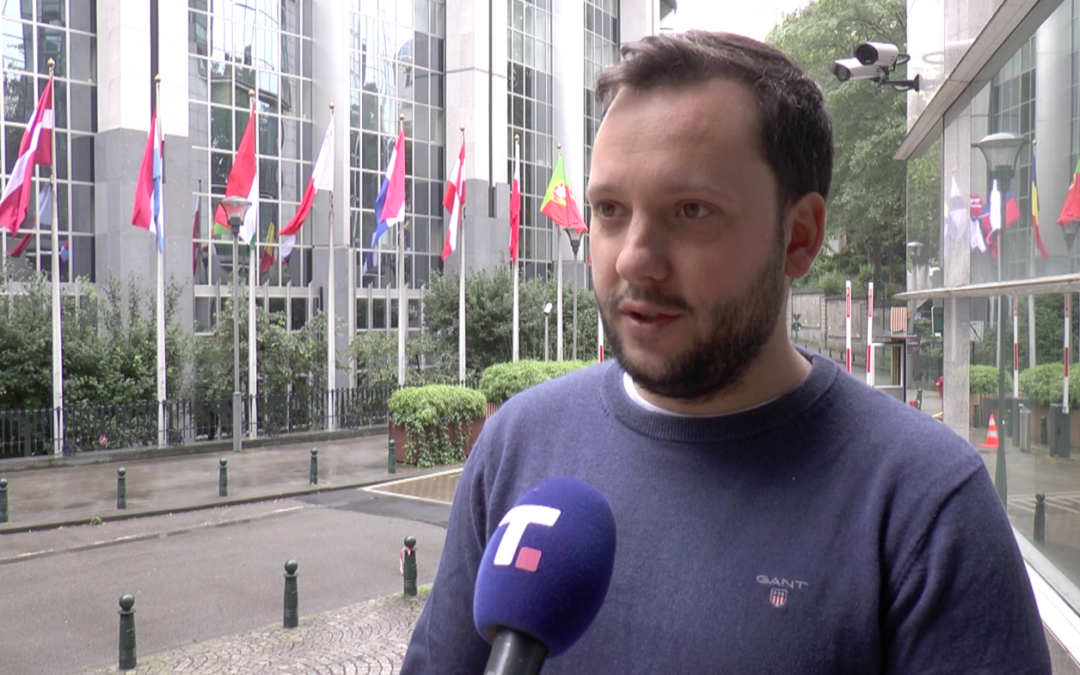Žiga Faktor, Deputy Director and Head of the Brussels office at Europeum, an independent think tank focusing on European integration and cohesion, does not expect the results of the 2024 European Parliament elections to have a significant impact on EU enlargement policy, he said in an interview with European Newsroom (enr) member agency Tanjug following the European Parliament elections.
“When it comes to the enlargement of the EU, it still falls under the EU’s foreign and security policy, which means that it is still firmly in hand of the member states and the Council,” he said. “Therefore it [the election results] will not have some dramatic impact, but the results of the elections will definitely somehow shape the direction in which discussions on the side of the European Parliament will be conducted,” Faktor added.
Currently, nine European countries have been granted candidate status and are thus waiting in line to be admitted as a member of the European Union: Albania, Bosnia and Herzegovina, Georgia, Moldova, Montenegro, North Macedonia, Serbia, Türkiye and Ukraine.
Following Russia’s invasion of its neighbour Ukraine in February 2022, the EU’s enlargement policy rapidly gained momentum. In December 2023, EU leaders agreed to open accession negotiations with Ukraine and Moldova, while granting candidate status to Georgia. In June 2024, negotiations with Ukraine and Moldova began. Negotiations are also ongoing with Albania and North Macedonia (both since 2022) as well as with Montenegro (since 2012) and Serbia (since 2014).
Budget shaped by European Parliament
Explaining how the election results could affect the budgetary aspects of enlargement, Faktor pointed at the role of the European Parliament in setting the EU’s budget.
The EU budget is adopted by the European Parliament and the Council of the EU, based on a proposal by the European Commission. The European Commission is then responsible for its implementation.
“For example, IPA funds, this can be somehow discussed between the levels of the Council and the Parliament, and this can have some additional obstacles to the financial support to the candidate countries, but the impact in general [will] not be so drastic,” Faktor believes.
With the so-called Instrument for Pre-Accession Assistance (IPA), the EU provides financial assistance to some countries in the enlargement region which are currently in the process of preparing for EU membership.
Among other things, the funds are intended to support the countries to make the political and economic reforms needed to take on the rights and obligations of EU membership. They also help the EU achieve some of its objectives, such as energy supply, climate change targets, and a sustainable economy.
Far-right lacks unified position on enlargement
Speaking about the extent to which the success of right-wing and far-right parties in the European elections could affect the EU’s enlargement policy and the implementation of the Growth Plan for the Western Balkans, Faktor said that there could be an impact on economic issues and – again – on the budget.
Like the IPA funds, the Growth Plan for the Western Balkans should help countries of the region accelerate both their accession process as well as economic growth. The financial pillar of the plan was adopted by the Council in May and will provide up to 2 billion euros in grants and 4 billion euros in loans to the EU’s six Western Balkan partners over the coming years.
“I don’t think this will anyhow have an impact on the implementation, unless there are some problems from the side of the candidate countries when it comes to the rule of law and European values. It could also affect less accessible funds from the fund,” said Faktor.
Concerning the general agenda of EU enlargement, Faktor pointed out that certain far-right parties are against enlargement due to the issue of migration and the socio-economic impact on the EU member states, and that some of them believe that such problems are related to the member states that finance the new members. However, he stressed that “there is no unified position when it comes to the far right across the EU towards the enlargement”.
Keeping the enlargement process going
Looking to the future, Faktor said that it is absolutely crucial to continue the EU enlargement process in the coming years, that is, in the next decade. “It is not important only for the geopolitical concerns, it is also important for the implementation of other thematic areas where the EU sees a plan for decarbonisation,” Faktor said.
“We will be talking about the Green agenda, although maybe in a different shape, we will be talking about migration, we will be talking about competitiveness of the EU, and in all those areas in the end, enlargement for the EU is important,” he added.
He stressed that it is also important to show that the EU stands firmly by its values and by the proposal that every European country can join the EU if it meets the conditions for membership.
This article is part of the enr’s EU Elections Spotlight: The EU after the European elections. The content is based on news by agencies participating in the enr.
